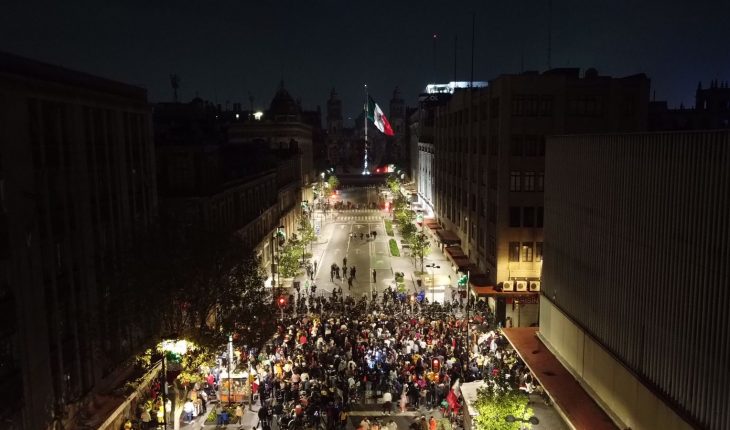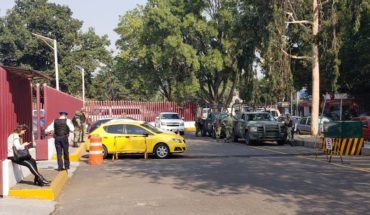If Mrs. Eva Frías were given a choice, she would have preferred to live in the era of the Independence movement, although this life, the one she had to live, selling tickets for the National Lottery at 71 years old, does not regret it either.
“Those were other times, where they fought to have a land, they managed to make Mexico free. There is no other country like ours: here is glory. Mexicans are free – only those who are in prison are not free,” he says from his business located near Reforma.
What is being Mexican? Pacian question. It is disobeying and going where one was not invited.
Hundreds of people walked through the streets of Madero and Pino Suárez who were trying to reach the Zócalo to see President Andrés Manuel López Obrador’s Cry of Independence up close, even though he had asked people not to show up to take care of the pandemic.
Some, knowing that they could not pass, still went and tried their luck, chewing gum and gluing, that here much is known about doing things bravely.
Photo: Carlo Echegoyen
Mixing of symbols. People with the shirt of the Mexican National Team passed through here; with charro hats and “Zapata” hats; with indigenous attire; with tricolored ribbons on the braids and light headbands; with false whiskers on top of the masks; with flags of Mexico and rattles in one hand, and in the other the figure of Santa Muerte; faces painted green, white and red; of the itinerant businesses sounded the music, corridos and salsas, and by Madero squealed the plastic bugles and the alive of the people, that to give the Scream it is not necessary to be president.
Some exercised their Mexicanness by crossing the street even with the traffic light in green and sneaking wherever they could.
Photo: Carlo Echegoyen
Unlike last year, this time there was a porosity or permissiveness that allowed people to walk through the streets surrounding the Zócalo and approach a few meters. Right there, behind the fences guarded by capital police, they clung to a place, like Sergio Callejas, who not for nothing came from so far away, from Arizona, with everything and his family, to see the Scream, yes, but also to accompany the president, make him feel that he is not alone, not like in September 2020, when López Obrador gave his cry to silence.
For some, as for this migrant, to be Mexican is to be militant.
“López Obrador has done a lot with little and you are seeing what he is doing. Those who had the opportunity to do it when there was, did not, stole everything. It is a pride for me to be Mexican, it is a pride the opportunity that life gave us to witness the government of this man,” says Callejas with his voice breaking.
He, who has lived more than 30 years outside the country — he left after Salinas won the 1988 election — doesn’t think Mexico is an independent country, because neither the United States nor Spain nor political parties have let him grow, he says.
There, many meters ahead, hours later, López Obrador will shout his lives to that freedom and sovereignty of which many remember only every September 15.
In her sit-in in front of Bellas Artes, separated by several streets, between tarps and tents where families of forcibly displaced people from Oaxaca live, Venustiana López, an indigenous teacher from the Triqui community, did not hear that the president also threw alive “the cultures of pre-Hispanic Mexico.”
Long live universal fraternity!
Long live the love of neighbor!
Long live the cultures of pre-Hispanic Mexico!
?️ @amormundi_ pic.twitter.com/YSLgresTzV
— Animal Político (@Pajaropolitico) September 16, 2021
“The president is not expected more, he only reminds us (in the speech), and in real life he does not solve problems of the indigenous people or of those who really want to be independent,” he says. “He talks a lot about the first peoples, but, so far, we do not see the solution, we do not see that it is his word, we do not see anything. We are Mexicans but we don’t quite agree with what the president is doing.”
Mexicans are given to make up for absences. Before an empty plate of the town, López Obrador, standing next to his wife, the writer Beatriz Gutiérrez, saw a light show that will remind him that in this Zócalo Tenochtitlán was founded, this same seminal center that yesterday was empty of its people, cornered on the shores.
“I see badly that he is restricted, I try to understand why, when he has said that he is from the people and for the people and that we were always going to take care of him ourselves, I, being indigenous, would like to be there, what good is it that he does not bring guaruras if he does these things to us?” asks Raquel Díaz Gutiérrez, a leader of fishermen from Oaxaca.
From his balcony in the National Palace, López Obrador also saw the luminous silhouette of Quetzalcoatl where a year ago he saw the faces of the heroes of Independence, the avengers of the vanquished, projected on the buildings surrounding the Zocalo. In their harangues appear again Hidalgo, Morelos, Josefa Ortiz, Allende, Vicario, Guerrero and, generically, the “anonymous heroes”. Who are you?
Lila Downs makes up for the absence, gives face to the generalization, in her song “Latin America”, which turns out to be one of the president’s favorites: “I am the photograph of a disappeared”, she sings in the country of disappearances; “peasant labor for your consumption,” “I am what holds my flag.”
Omar Jonathan, lonely, sits among Mexican flags, dresses, rattles, toy guitars and paintings, watching humanity transform. Every September 15 he and his family travel to Mexico City from San Antonio Pueblo Nuevo, Toluca, to sell. What is it that this young man misses the most who carries his Chihuahua dog in his legs dressed in a hat and a dress? To the people who touch, he says.
“More than selling, you did it with love and passion for your work, because you see people and the profit was good, but more was the unity with your neighbor, relating; now things are different, of far, the less you get closer to me is better, if I don’t sanitize you I don’t touch you, things like that,” he says.
Mexicans also exercise that fraternity that the president highlighted in his harangue. Omar Jonathan says he is proud to have learned how to make a rattle or a dress – “all that fills me with love for my predecessors” – and Claudia Dorantes, another merchant, presumes to be the daughter, granddaughter and great-granddaughter of a family that has lived by selling tickets of the National Lottery: “I am very Mexican because I continue to sell tickets and it is a tradition of more than 240 years,” he summarizes.
Mexico is a country, but patriotism has no fixed place. Many people who could not enter the Zocalo decide to leave, because life goes on. In front of Bellas Artes there are open bars and, on the street, random couples practice salsa and cumbia steps. There are people taking pictures with artists disguised as revolutionaries; hours ago the organ builders left.
Mexicans, who are given to esotericism, are struck by a skull that wears a garment that resembles the flag of Mexico. In exchange for tips, that skull gives away papers that decipher people’s destiny in money, love, and health.
A young woman hands over her tip and receives the key to her destiny from the hands of the skull that could well be an allegory of the country. He reads it quietly, but refuses to reveal the contents.
“It’s bad luck,” he explains.
What we do at Animal Político requires professional journalists, teamwork, dialogue with readers and something very important: independence. You can help us keep going. Be part of the team.
Subscribe to Animal Político, receive benefits and support free journalism.#YoSoyAnimal





